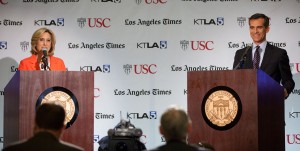Mayoral candidates pull no punches at USC debate
With a runoff election almost two weeks away, Councilman Eric Garcetti and City Controller Wendy Greuel used their political records and personal biographies — not to mention a few sharp attacks — to each argue that they were most qualified to run City Hall.
The Sunday night debate at USC’s Galen Center touched upon a range of local and national policy issues, including the candidates’ relationships with the Department of Water and Power, immigration reform, poverty and age restrictions on Plan B.
The debate was co-moderated by Dan Schnur, director of the Jesse M. Unruh Institute of Politics, and Jim Newton, editor-at-large and columnist at the Los Angeles Times. Both candidates agreed that their No. 1 policy priority is to create more jobs. As of April, the unemployment rate for Los Angeles County has ticked down to 10.2 percent, but remains higher than the national average of 7.5 percent.
Greuel said she would recruit businesses, move the city away from a gross receipts tax, encourage technology investment and push for local hiring. She also pointed to her experience of owning her family’s hardware store and working as an executive at DreamWorks.
“My public policy is to create jobs that make Los Angeles the most jobs-friendly, business-friendly city in America,” Greuel said.
Like Greuel, Garcetti laid out steps for creating jobs, such as also abolishing the gross receipts tax and creating resource centers to make growing businesses easier. He cited a series of political accomplishments, such as the revival of Attwater Village and saving a training program at Van Nuys Airport, as examples of his ability.
“Everything we want to do will come from our ability to make sure people are working here and that businesses can stay here, come here and grow here,” Garcetti said.
But one of the most memorable moments of the debate came when the candidates were asked if they disagreed about any policy components on the issue of jobs. The answer: “No.”
“One of the most common observations about this campaign is that there aren’t huge, substantive policy differences between the two and that moment crystallized that sentiment,” Schnur said after the debate. “They both simply said no.”
Out of the gate, Garcetti and Greuel responded to a question about whether they genuinely believed their opponent was “a dishonest person,” as attacks launched by both sides suggested throughout the race. Each candidate said they saw the other as honest, but then pointed to controversies.
The candidates traded spats throughout the debate in an effort to connect one another to the DWP. The utility has became a recent subject of controversy after the L.A. Times reported that its employees earned an average of close to $100,000 in 2011 — 50 percent more than other city employees make.
Greuel came under fire several times for campaign contributions from an independent committee that has received funding from the union representing most DWP workers.
“They have disproportionately imbalanced this race,” Garcetti said. “And the fact of the matter is we both did not compete for that endorsement. There was never even an interview given.”
Likewise, Greuel attacked Garcetti for an email that asked him, as City Council president, to delay a hearing on a DWP-backed measure. She also accused him of voting for DWP raises, as rates increased.
“In 2009, in that tough economic time, my opponent voted for those DWP raises and said this is the best that we can do, this is the best deal we can have,” Greuel said.
After an hour of questions from the moderator, two USC students and two high school students in the audience posed four questions to the candidates on issues ranging from traffic to reforming the California Environmental Quality Act.
Schnur said student participation was an important component to hosting the debate on USC’s campus.
“The only thing I would change in retrospect would be to have more student questions,” Schnur said.
At another point in the debate, Schnur surprised the two candidates by asking their position on age restrictions for accessing plan B, sometimes called the morning-after pill. Greuel said decisions such as those should be left to conversations between doctors and patients, while Garcetti said he does not support age limits.
When it came to immigration reform, both candidates said they opposed the exclusion of benefits for same-sex partners and limitations on visas for family reunification in the bill currently being debated in Washington D.C.
Both candidates touted their support from politicians and organizations. At several points, Garcetti referenced his endorsement from the Los Angeles Times, as did Greuel referenced hers from former President Bill Clinton.
Additionally, when asked if Greuel’s gender should impact a voter’s decision, she noted the historical significance of her campaign, but said voters should ultimately decide on the basis of her accomplishments and qualifications.
“People need to judge me on what I’ve accomplished and my qualifications, but there is a historical nature to it,” said Greuel, who would be the city’s first female mayor.
Garcetti, who would be L.A.’s first elected Jewish mayor, also said the candidates’ demographic characteristics should not outweigh their political records.
“What I’ve said is, ‘I don’t want your vote because I’m Latino or Jewish. I don’t want your vote because I speak Spanish,'” Garcetti said. “I want your vote because of my record, and I think that’s what voters look at.”
The Unruh Institute of Politics and the Los Angeles Times sponsored the debate, with the Los Angeles Fire Department Foundation and the Junior State of America serving as community sponsors. It was broadcast live on KTLA-TV channel 5.
The election for L.A.’s next mayor is scheduled for May 21. Mayor Antonio Villaraigosa, who assumed office in 2005, will leave his post on June 30.



Yes, I agree…it can be a difficult job to control the rabble :) at these events.
Great job as moderator Dan.